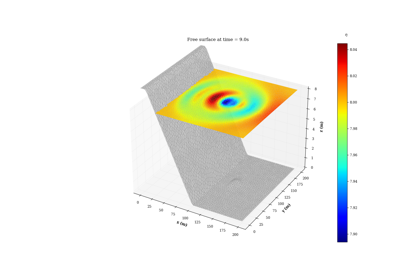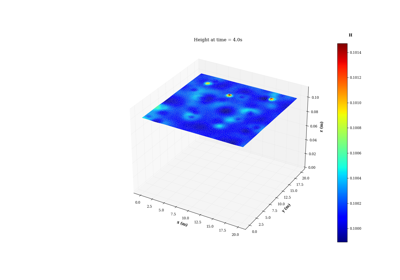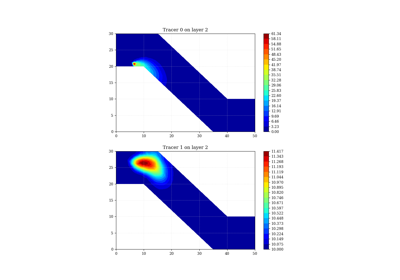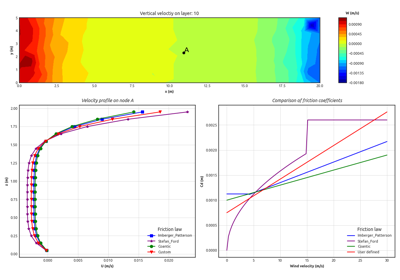External effects¶
- class freshkiss3d.TopographySource¶
- Parameters
sources (list(float) (same size as times)) – Homogeneous in space topography source.
sources_cell (float[NC] or list(float[NC])) – Topography source defined for each cell.
sources_funct (function(x,y) or list(function(x,y)) (same size as times)) – Heterogeneous in space topography source.
source_unit (string) – Topography source unit=’m’ or ‘m/s’ (default=’m/s’). m/s: continuous distribution of the source over time. m: sparse distribution of the source over time (the source is triggered at specified times).
cells (list(int)) – Cells on which to apply topography source (default: whole domain)
- scheduler¶
Scheduler that triggers height source at given times (when unit=’m’)
Examples using freshkiss3d.TopographySource¶
- class freshkiss3d.HeightSource¶
- Parameters
sources (list(float) (same size as times)) – Homogeneous in space height source.
sources_funct (function(x,y) or list(function(x,y)) (same size as times)) – Heterogeneous in space height source.
source_unit (string) – Height source unit=’m’ or ‘m/s’ (default=’m/s’). m/s: continuous distribution of the source over time. m: sparse distribution of the source over time (the source is triggered at specified times).
cells (list(int)) – Cells on which to apply height source (default: whole domain)
- scheduler¶
Scheduler that triggers height source at given times (when unit=’m’)
Examples using freshkiss3d.HeightSource¶
- class freshkiss3d.TracerSource¶
- Parameters
sources (list(float) (same size as times)) – Homogeneous in space tracer source.
sources_funct (function(x,y,z) or list(function(x,y,z)) (same size as times)) – Heterogeneous in space tracer source.
source_unit (string) – Tracer source unit=’[T]’, ‘[T]/s’, ‘kg/s’ or ‘kg’ (default=’[T]/s’). [T]/s: continuous distribution of the source over time. [T]: sparse distribution of the source over time (the source is triggered at specified times). For species, instead of giving the source in kg/m3 you can give the source in kg, then source term is applied based on source in kg and total cells’ volume in m3.
tracer_label (string) – Tracer on which to apply source (for multiple tracers) (default=None). If tracer_label=’temperature’ then [T] means Celcius degree. If tracer_label=’salinity’ or ‘species’ then [T] means kg/m3.
cells (list(int)) – Cells on which to apply tracer source (default: whole domain)
- scheduler¶
Scheduler that triggers tracer source at given times (when unit=’kg’)
Examples using freshkiss3d.TracerSource¶
- class freshkiss3d.WindEffect¶
- Parameters
velocity (float[]) – Wind velocity in m/s
orientation (float[size(wind_velocity)]) – Wind orientation in Azimuth degree (North=0°;East=90°;South=180°;West=270°) (x pointing towards East and y towards North)
times (float[size(wind_velocity)]) –
friction_law (string ('Imberger_Patterson', 'Stefan_Ford', 'Coantic')) – Friction law (default: ‘Imberger_Patterson’)
friction_law_funct (function of wind_velocity) – Friction cefficient law (default: None)
- static from_file()¶
Initialize Wind from file
- interpolate_orientation()¶
Interpolate orientation over time and returns value of wind orientation at current time
- interpolate_velocity()¶
Interpolate velocity over time and returns value of wind velocity at current time
Examples using freshkiss3d.WindEffect¶
- class freshkiss3d.WheelEffect¶
- The usage of this class is:
Contruct a Wheel.
- In the time’s loop:
Call Wheel::rotates to provide time’s information so paddle’s angles are computed.
- Loop on mesh vertices.
Call Wheel::set_vertex.
If true is returned, call Wheel::elementary_force.
If returned value greater that 0, get the elementary forces with Wheel::get_fxg.
Continue with next time’s loop iteration.
Other methods Wheel::glo2loc, Wheel::loc2glo, Wheel::loc2cyl, Wheel::cyl2loc are provided for convenience and completness, but are useless in common usage.



